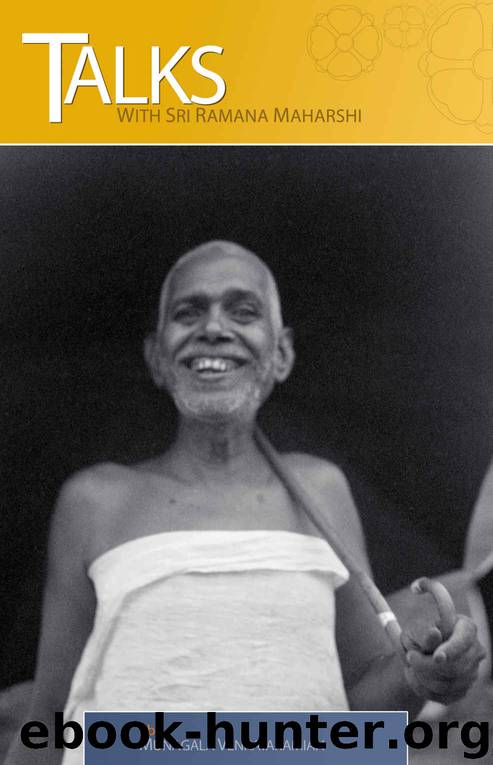Talks with Sri Ramana Maharshi by Munagala Venkataramiah

Author:Munagala Venkataramiah [Venkataramiah, Munagala]
Language: eng
Format: epub
Publisher: Sri Ramanasramam
Published: 2018-05-04T04:00:00+00:00
21st March, 1937
Talk 375.
A middle-aged Kanarese visitor asked about akarma (actionless act).
M.: Whatever one does after the ego has vanished is akarma.
Talk 376.
A learned Telugu visitor, who had composed a song in praise of Sri Bhagavan, read it out, placed it at His feet and saluted. After a time he asked for upadesa.
M.: The upadesa is contained in Upadesa Saram.
D.: But oral and personal instruction is valuable.
M.: If there be anything new and hitherto unknown upadesa will be appropriate. Here it happens to be stilling the mind and remaining free from thoughts.
D.: It looks impossible.
M.: But it is precisely the pristine and eternal state of all.
D.: It is not perceived in our everyday active life.
M.: Everyday life is not divorced from the Eternal State. So long as the daily life is imagined to be different from the spiritual life these difficulties arise. If the spiritual life is rightly understood, the active life will be found to be not different from it.
Can the mind be got at by the mind on looking for it as an object? The source of the mental functions must be sought and gained. That is the Reality.
One does not know the Self owing to the interference of thoughts. The Self is realised when thoughts subside.
D.: “Only one in a million pursues sadhanas to completion.” (Bh. Gita, VII, 3).
M.: “Whenever the turbulent mind wavers, then and there pull it and bring it under control.” (Bh. Gita, VI, 26.) “Seeing the mind with the mind” (manasa mana alokya), so proclaim the Upanishads.
D.: Is the mind an upadhi (limiting adjunct)?
M.: Yes.
D.: Is the seen (drisya) world real (satya)?
M.: It is true in the same degree as the seer (drashta), subject, object and perception form the triad (triputi). There is a reality beyond these three. These appear and disappear, whereas the truth is eternal.
D.: These triputi sambhava are only temporal.
M.: Yes, if one recognises the Self even in temporal matters these will be found to be non-existent, rather inseparate from the Self; and they will be going on at the same time.
22nd March, 1937
Talk 377.
A middle-aged Andhra visitor: A man is said to be divine. Why then does he have regrets?
M.: Divinity refers to the essential nature. The regrets are of Prakriti.
D.: How is one to overcome regrets?
M.: By realising the Divinity in him.
D.: How?
M.: By practice.
D.: What kind of practice?
M.: Meditation.
D.: Mind is not steady while meditating.
M.: It will be all right by practice.
D.: How is the mind to be steadied?
M.: By strengthening it.
D.: How to strengthen it?
M.: It grows strong by satsanga (the company of the wise).
D.: Shall we add prayers, etc.?
M.: Yes.
D.: What of the one who has no regrets?
M.: He is an accomplished Yogi. There is no question about him.
D.: People cite disasters, e.g., earthquakes, famines, etc., to disprove God. How shall we meet their contention?
M.: Wherefrom have they come - those who argue?
D.: They say, “Nature”.
M.: Some call it “Nature” - others “God”.
D.: Are we to keep anything against a rainy day; or to live a precarious life for spiritual attainments?
M.
Download
This site does not store any files on its server. We only index and link to content provided by other sites. Please contact the content providers to delete copyright contents if any and email us, we'll remove relevant links or contents immediately.
Becoming Supernatural by Dr. Joe Dispenza(8186)
Crystal Healing for Women by Mariah K. Lyons(7912)
The Witchcraft of Salem Village by Shirley Jackson(7243)
Inner Engineering: A Yogi's Guide to Joy by Sadhguru(6776)
The Four Agreements by Don Miguel Ruiz(6729)
The Power of Now: A Guide to Spiritual Enlightenment by Eckhart Tolle(5726)
Secrets of Antigravity Propulsion: Tesla, UFOs, and Classified Aerospace Technology by Ph.D. Paul A. Laviolette(5358)
The Wisdom of Sundays by Oprah Winfrey(5135)
Room 212 by Kate Stewart(5091)
Pale Blue Dot by Carl Sagan(4984)
Fear by Osho(4722)
The David Icke Guide to the Global Conspiracy (and how to end it) by David Icke(4685)
Animal Frequency by Melissa Alvarez(4445)
Rising Strong by Brene Brown(4431)
How to Change Your Mind by Michael Pollan(4338)
Sigil Witchery by Laura Tempest Zakroff(4229)
Man and His Symbols by Carl Gustav Jung(4116)
The Art of Happiness by The Dalai Lama(4116)
Real Magic by Dean Radin PhD(4114)
